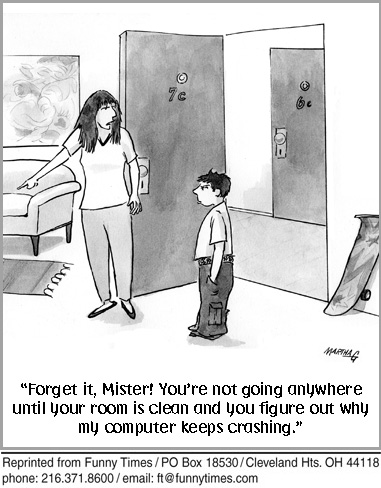Despite considerable progress having been made over the past 20 years, many children still live in households led by cybernetically-impaired parents. These parents put up a brave front, but they are all thumbs when it comes to texting. They think tweeting is what birds do. Ask them about virus protection and they’ll go wash their hands. We need to be on the lookout for children living with pixel-puzzled parents. These kids need our support and attention, as well as practical tools if they are to deal successfully with the demands of their challenging home environment. Here are some practical tips I offered to a teen who wrote in with this very problem.
Dear Alex,
I’m the technically gifted one in my family, and everyone (especially my parents) comes to me with their computer and Internet questions. They expect me to drop everything just because they deleted a file or got some error message that has them convinced their computer is going to self-destruct in 30 seconds. Is there anything I can do to discourage this dependence on me?
Discourage it? You want to encourage it with every fiber of your being.
Look, the reason grown-ups have children is to ensure that somebody in the house will know how to sync phones with tablets, program the thermostat, and get back the TV channels that disappeared. Sure, more and more parents are getting up to speed with their techno-gadgets, but there’s always something they can learn from their kids. Computer-savvy kids love to help their parents out. You can use your superior knowledge to get your parents to buy all sorts of stuff you’ve been dying to have. You can say to your dad:
“The only thing that will solve your problem once and for all is a Phantom X-Treme liquid neon color master 1350 watt gaming computer with 24X dual format DVD+R/+RW plus CD-R/-RW drives, Rampage Ultra Quad Cards, 8 channel HD audio, Soundblaster X-Fi Titanium headset, and a Thunderbolt S23A950D Black 28" Full HD 3D LED LCD BackLight Monitor.”
Dad might scratch his head and say:
“I need all that just because my phone is dead?”
To which you would confidently reply:
“Well, you could just charge your battery but I think this would work a lot better, Dad.”
You also have a priceless opportunity to model proper teaching behavior for your parents. This, of course, will take a great deal of patience on your part. Adults tend to ask silly questions, rush ahead without reading directions, and get defensive when being corrected. Here are the best techniques for instructing adults without hurting their feelings or injuring their self-confidence:
Be tolerant. Grownups just aren’t as experienced as kids in many areas. Tech-ease is one of them. It’s not your parents’ fault if they’re cybernetically challenged. Treat them with respect. Assume that they have the ability to learn. At all costs, avoid remarks such as “How could you be so dumb?” or “Can’t you do anything right?”
Be patient. Experience is the best teacher—even if it means making mistakes. When you see your parents head off in the wrong direction, resist the temptation to jump in and take over. If they’re about to nuke the hard drive or something equally irrevocable, you can usually prevent it by saying “Let’s just consider this for a minute before proceeding.” Then ask questions to help them think through their actions before taking them. Most adults will make responsible decisions if trusted to do so.
Be encouraging. In the face of their children’s techno-brilliance, many parents lack confidence, feel stupid, and get easily discouraged. You must counter these feelings. Be a cheerleader for your folks. Say:
“You’re doing great!”
“Keep up the good work!”
“Look out, Bill Gates!”
Be realistic. Your parents will want to come across as streetwise and cool when they text, message, and post online, which means they may try to use Internet slang in their communications. This is fraught with danger if they don’t know what they’re doing. For example, did you hear about the mom who texted her son with bad news?
You can see the trouble parents can get into if they text beyond their abilities. Caution your parents about the downside of abbreviations and acronyms. Encourage them to consult online slang dictionaries before attempting any fancy texting tricks.
If you practice these teaching methods diligently, you’ll find that your parents’ computer, social media, and online skills will increase to the point where they’ll be less dependent on you for help. And, given your shining example, they may start to use these methods of instruction with you.
Adapted from How Rude! by Alex J. Packer, copyright © 2014. Used with permission of Free Spirit Publishing Inc., Minneapolis, MN; 800-735-7323; www.freespirit.com. All rights reserved.


